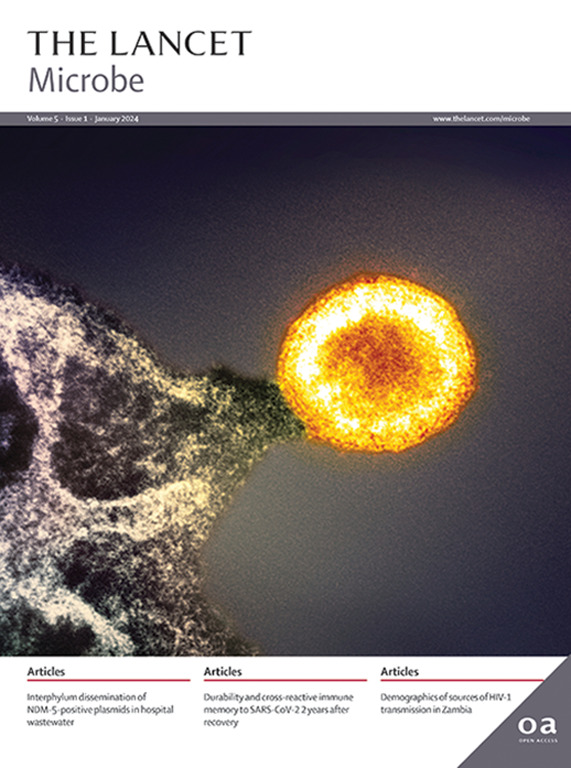临床供体特征对丹麦艰难梭菌感染患者粪便微生物群移植成功率的影响:一项单中心前瞻性队列研究。
IF 20.9
1区 生物学
Q1 INFECTIOUS DISEASES
引用次数: 0
摘要
背景:粪便微生物群移植(FMT)是治疗复发性艰难梭菌感染的有效方法,但供体选择影响其临床成功。我们的目的是研究临床供体特征对艰难梭菌感染患者FMT结果的影响。方法:在这项单中心前瞻性队列研究中,我们纳入了2016年5月2日至2023年10月31日期间,所有符合国家粪便捐赠标准并向丹麦奥胡斯大学医院粪便微生物群移植中心捐赠的捐赠者,以及接受单剂量FMT治疗的原发性或复发性艰难梭菌感染的相应接受者。在混合效应模型中,我们评估了供体性别、年龄、BMI、吸烟状况、捐赠粪便一致性、捐赠总重量、抗生素使用、幽门螺杆菌携带、出生方式、供体-受体性别一致性和粪便捐赠α多样性对受体FMT结局的影响。主要终点是FMT后8周患者与艰难梭菌感染相关的腹泻的消退。结果:145名同时捐献粪便的献血者中,男性115人(79.3%),女性30人(20.7%)。952例难辨梭菌感染患者中,90例(62.1%)为1351例可评估的fmt提供粪便。口服胶囊治疗1037例(76.8%),结肠镜治疗151例(11.2%),鼻空肠管治疗163例(12.1%)。捐献前3-12个月使用抗生素降低了FMT的有效性(优势比0.55 [95% CI 0.33 - 0.91];p = 0·019)。与布里斯托尔粪便量表(BSFS)得分为3分的捐赠相比,得分为4分的捐赠(优势比1.38 [95% CI 1.04 -1·83];P = 0.024)和5及以上(2.89[1.33 -6·26];p=0·0072)表明FMT的有效性有所提高。供体性别、BMI、吸烟状况、携带幽门螺杆菌、出生方式、总供体重量和供体-受体性别一致性对FMT结果没有影响。解释:扩大目前的献血者选择标准,以避免在捐献前12个月内使用抗生素,并包括BSFS评分为5分的献血者,可能会改善艰难梭菌感染患者的FMT结果。我们的研究结果呼吁修订目前的临床供体筛选实践,未来的研究可以进一步优化选择最佳粪便供体的标准。资助:丹麦创新基金。本文章由计算机程序翻译,如有差异,请以英文原文为准。
Effects of clinical donor characteristics on the success of faecal microbiota transplantation for patients in Denmark with Clostridioides difficile infection: a single-centre, prospective cohort study
Background
Faecal microbiota transplantation (FMT) is an effective treatment for patients with recurrent Clostridioides difficile infection, but donor selection can influence its clinical success. We aimed to investigate the effect of clinical donor characteristics on FMT outcomes in patients with C difficile infection.
Methods
In this single-centre, prospective cohort study, we included all donors who fulfilled the national criteria for faeces donation and delivered donations to the Centre for Faecal Microbiota Transplantation, Aarhus University Hospital, Denmark, between May 2, 2016, and Oct 31, 2023, and corresponding recipients treated with one-dose FMT for primary or recurrent C difficile infection. In mixed-effects models, we evaluated the effect of donor sex, age, BMI, smoking status, donation stool consistency, total donation weight, antibiotic use, Helicobacter pylori carriage, birth mode, donor−recipient sex concordance, and the alpha diversity of faeces donations on FMT outcomes in recipients. The primary outcome was the resolution of diarrhoea associated with C difficile infection in patients 8 weeks after FMT.
Findings
Among 145 blood donors who also donated faeces, 115 (79·3%) were men and 30 (20·7%) were women. 90 (62·1%) provided faeces for 1351 evaluable FMTs in 952 patients with C difficile infection. 1037 (76·8%) FMTs were administered through oral capsules, 151 (11·2%) via colonoscopy, and 163 FMTs (12·1%) via nasojejunal tube. Antibiotic use 3–12 months before donation decreased the effectiveness of FMT (odds ratio 0·55 [95% CI 0·33–0·91]; p=0·019). Compared with donations with a Bristol Stool Form Scale (BSFS) score of 3, donations with a score of 4 (odds ratio 1·38 [95% CI 1·04–1·83]; p=0·024) and 5 or above (2·89 [1·33–6·26]; p=0·0072) showed improved FMT effectiveness. Donor sex, BMI, smoking status, H pylori carriage, birth mode, total donation weight, and donor−recipient sex concordance did not affect FMT outcomes.
Interpretation
Expanding current donor selection criteria to avoid antibiotic use in the 12 months preceding donation and including donations with a BSFS score of 5 might improve FMT outcomes for patients with C difficile infection. Our findings call for the revision of current clinical donor screening practices, and future studies could further optimise the criteria for selecting optimal faeces donors.
Funding
Innovation Fund Denmark.
求助全文
通过发布文献求助,成功后即可免费获取论文全文。
去求助
来源期刊

Lancet Microbe
Multiple-
CiteScore
27.20
自引率
0.80%
发文量
278
审稿时长
6 weeks
期刊介绍:
The Lancet Microbe is a gold open access journal committed to publishing content relevant to clinical microbiologists worldwide, with a focus on studies that advance clinical understanding, challenge the status quo, and advocate change in health policy.
 求助内容:
求助内容: 应助结果提醒方式:
应助结果提醒方式:


